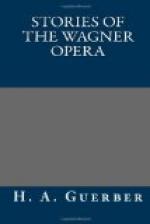Daland then explains to his daughter that his guest is a wanderer and an exile, although well provided with this world’s goods, and asks her whether she would be willing to listen to his wooing, and would consent to ratify his conditional promise by giving the stranger her hand:—
’Wilt thou, my child, accord
our guest a friendly welcome,
And wilt thou also let him
share thy kindly heart?
Give him thy hand, for bridegroom
it is thine to call him,
If thou but give consent,
to-morrow his thou art.’
Wholly uninfluenced by the description of the stranger’s wealth which her father gives her, but entirely won by the Flying Dutchman’s timidly expressed hope that she will not refuse him the blessing he has so long and so vainly sought, Senta hesitates no longer, but generously promises to become his wife, whatever fate may await her:—
’Whoe’er thou art, where’er
thy curse may lead thee,
And me, when I thy lot mine
own have made,—
Whate’er the fate which
I with thee may share in,
My father’s will by
me shall be obeyed.’
This promise at first fills the heart of the Flying Dutchman with the utmost rapture, for he is thinking only of himself, and of his release from the curse, but soon he begins to love the innocent maiden through whom alone he can find rest. Then he also remembers that, if she fail, she too will be accursed, and, instead of urging her as before, he now tries to dissuade her from becoming his wife by depicting life at his side in the most unenticing colours, and by warning her that she must die if her faith should waver. Senta, undeterred by all these statements, and eager if necessary to sacrifice herself for her beloved, again offers to follow him, and once more a rapturous thrill passes through his heart:—
’Senta.
Here is my hand! I will
not rue,
But e’en to death will
I be true.
The Dutchman.
She gives her hand! I
conquer you,
Dread powers of Hell, while
she is true.’
Daland returns into the room in time to see that they have agreed to marry, and proposes that their wedding should take place immediately, and be celebrated at the same time as the feast which he generally gives all his sailors at the end of a happy journey.
The third act of this opera represents both ships riding at anchor in a rocky bay, near which rises Daland’s picturesque Norwegian cottage. All is life and animation on board the Norwegian vessel, where the sailors are dancing and singing in chorus, but the black-masted ship appears deserted, and is as quiet as the tomb.




